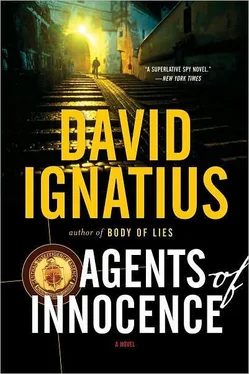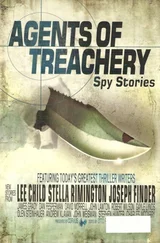David Ignatius - Agents of Innocence
Здесь есть возможность читать онлайн «David Ignatius - Agents of Innocence» весь текст электронной книги совершенно бесплатно (целиком полную версию без сокращений). В некоторых случаях можно слушать аудио, скачать через торрент в формате fb2 и присутствует краткое содержание. Жанр: Шпионский детектив, на английском языке. Описание произведения, (предисловие) а так же отзывы посетителей доступны на портале библиотеки ЛибКат.
- Название:Agents of Innocence
- Автор:
- Жанр:
- Год:неизвестен
- ISBN:нет данных
- Рейтинг книги:3 / 5. Голосов: 1
-
Избранное:Добавить в избранное
- Отзывы:
-
Ваша оценка:
- 60
- 1
- 2
- 3
- 4
- 5
Agents of Innocence: краткое содержание, описание и аннотация
Предлагаем к чтению аннотацию, описание, краткое содержание или предисловие (зависит от того, что написал сам автор книги «Agents of Innocence»). Если вы не нашли необходимую информацию о книге — напишите в комментариях, мы постараемся отыскать её.
Agents of Innocence — читать онлайн бесплатно полную книгу (весь текст) целиком
Ниже представлен текст книги, разбитый по страницам. Система сохранения места последней прочитанной страницы, позволяет с удобством читать онлайн бесплатно книгу «Agents of Innocence», без необходимости каждый раз заново искать на чём Вы остановились. Поставьте закладку, и сможете в любой момент перейти на страницу, на которой закончили чтение.
Интервал:
Закладка:
The Israelis attacked Lebanon again, this time with air strikes against Hasbayah, Marjayoun, and other towns and villages in South Lebanon that had become guerrilla bases. The Israeli raids produced heavy casualties among Lebanese civilians. The Lebanese government briefly considered buying antiaircraft missiles from France to protect its territory. The deal collapsed when Lebanese fixers began demanding huge payoffs for certain interested Lebanese government officials.
The new wave of Palestinian terror became the favorite spectator sport of the Western world. The Fatah leaders, who had nearly disappeared from public view, suddenly found journalists arriving by the score from Europe and America, clamoring for interviews. The Palestinians had become, once again, figures of horror and fascination. The Old Man appeared on magazine covers in his dark glasses and stubbly beard. While his acolytes in the West urged him to shave and dress respectably, the Old Man stuck to his guerrilla garb. He understood that the whole point of the exercise was to look like an outlaw, a blackguard, a despicable and terrifying symbol of violence. Jamal understood it, too. As he made his rounds in Europe and read the extravagant accounts of Black September’s terrorist exploits that were appearing in the newspapers, he could only laugh. Abu Nasir had been right. The ability to create fear is a powerful weapon.
33
Rome; April 1972
Omar Mumtazz was arrested on April 7 at Rome’s Fiumicino Airport. A plainclothes customs official noticed him nervously chain-smoking while waiting for his baggage on a flight arriving from Beirut.
When the nervous-looking Arab grabbed his luggage and headed toward the green “Nothing to Declare” exit, the customs officer stopped him and pointed him toward one of the uniformed officers in the red line. Omar Mumtazz still might have made it if he had kept cool. But when the Italian customs official asked to see his passport, Mumtazz slipped a hundred-dollar bill inside the document. This is a Mediterranean country, he told himself. This is how we do business in the Mediterranean.
The customs official opened the passport and watched the green bill float gently to the floor. He gave a thin smile and called to his captain. A few moments later Mumtazz was taken by three armed men to a cramped office, where he watched with mounting apprehension as a customs official cut through the false bottom of his suitcase. Out of the opening tumbled four fat packets of heroin.
Mumtazz made a terrible row. Though he had only an ordinary Libyan passport, he claimed that he was an intelligence officer who had done work for the Italians. He had powerful friends! He demanded to see someone-immediately!-from the Servizio Informazione Difesa.
The Carabinieri thought he was just another two-bit Arab hoodlum in a fancy suit. But he made such a racket, even after he was punched several times in the stomach, that a Carabinieri officer finally placed a telephone call. An hour later a bedraggled major from the SID arrived and the Libyan began to lay out his story.
“I know something that is very important,” he said. The major dully nodded his head.
“I know someone who is planning the worst crimes! The very worst! A Palestinian!”
“Dica. Dica,” said the bored major.
“I will tell the information to a senior officer. To him only!”
One of the Caribinieri kicked the Libyan in the shins. He screamed and looked around the room desperately.
“The president!” he shouted. “They are planning to kill the President of the United States.”
The SID major took Mumtazz to a basement cell at the Ministry of Defense on Via Venti Settembre. There, the Libyan told his story to a captain who listened intently and took careful notes.
The Libyan claimed he had information about a new Palestinian terrorist organization that was planning a string of spectacular operations culminating in the assassination of the American president. He said he had met the group’s chief of operations-a man who called himself Nabil-in Rome a few months earlier. He had provided Nabil with women, introducing him to several German girls he knew in Rome, and later with guns and explosives. As he narrated the tale, Mumtazz watched the Italian captain to gauge his interest and see if he was taking notes.
Mumtazz gave a brief physical description of Nabil. He was tall and strikingly handsome, with thick black hair and a clean-shaven face. He spoke several languages, including English and some Italian. He was aloof, secretive about his work, and highly intelligent. He liked to drink and smoke and seemed to have an inexhaustible appetite for European women.
When Mumtazz got to the Palestinian’s sex habits, he noticed that the Italian officer was looking at him dubiously.
“Every word is true!” protested the Libyan. “If you don’t believe me, ask one of your own men in the Italian Embassy in Tripoli. Giuseppe Rosso! He knows me! He will vouch for me!”
The captain wrote down the name. But as he did so, he arched his eyebrows high on his forehead.
“I have tapes!” said the Libyan, leaning forward as if sharing a great secret.
“Tapes?” asked the Italian captain.
“Yes!” said the Libyan triumphantly. “Tapes! Of Nabil talking to me on the telephone about his plans. In code!”
The SID man put aside his notebook and picked up the telephone to call a colonel.
“Immunity! I give you nothing without immunity!” shouted the Libyan as the captain dialed the number.
“No immunity, no tapes!”
Mumtazz told his story again, for the third time that day, to the SID colonel. The more senior his interrogator, the more details he provided. The colonel listened and then telephoned another colonel in a different department of the intelligence service. There were consultations. Mumtazz was asked to remain overnight and provided with hot food and a soft bed.
The next morning, when files had been checked and cables received from the Italian Embassy in Tripoli, the SID men met again for further consultations. Yes, said one of the colonels, the service did in fact have a tenuous relationship with a Libyan named Omar Mumtazz. He was from one of the wealthy old Libyan families that had collaborated with the Italians during the colonial period and prospered later under King Idriss. According to the SID man in Tripoli, Omar Mumtazz was a young dilettante, half-ideologue, half-pimp. He travelled in unusual Arab circles-the criminal underworld and the radical political fringe-and had provided occasional tidbits of information about Libyans, Syrians, Palestinians.
The Italian officials agreed that Mumtazz should be asked to confirm his story. If he could indeed furnish tape recordings of Nabil, then the SID would recommend to the Italian Ministry of Interior that the drug-smuggling charges against him be dropped.
The offer was conveyed orally to the Libyan. Feeling cocky, Omar Mumtazz asked for it in writing. Whereupon one of the SID colonels slapped him twice on the face and walked out of the room.
Mumtazz dropped his request. The tapes were in a safe deposit box at a branch of the Banca Commerciale Italiana, he said. He was taken there by two soldiers dressed in plainclothes. To their surprise, the Libyan emerged from the bank vault after several minutes smiling and clutching a reel of tape. The colonels back at headquarters were even more surprised when they played the tape and heard on it the voice of an Arab man, talking in English in what sounded like a private code. He said he needed four suits and ten pairs of shoes and would pick them up at eight o’clock.
Mumtazz explained that in the code he had worked out with Nabil, the message meant that the Palestinian wanted four pistols with silencers and 100 kilos of plastic explosive, and would pick up the shipment at four the following day.
Читать дальшеИнтервал:
Закладка:
Похожие книги на «Agents of Innocence»
Представляем Вашему вниманию похожие книги на «Agents of Innocence» списком для выбора. Мы отобрали схожую по названию и смыслу литературу в надежде предоставить читателям больше вариантов отыскать новые, интересные, ещё непрочитанные произведения.
Обсуждение, отзывы о книге «Agents of Innocence» и просто собственные мнения читателей. Оставьте ваши комментарии, напишите, что Вы думаете о произведении, его смысле или главных героях. Укажите что конкретно понравилось, а что нет, и почему Вы так считаете.












